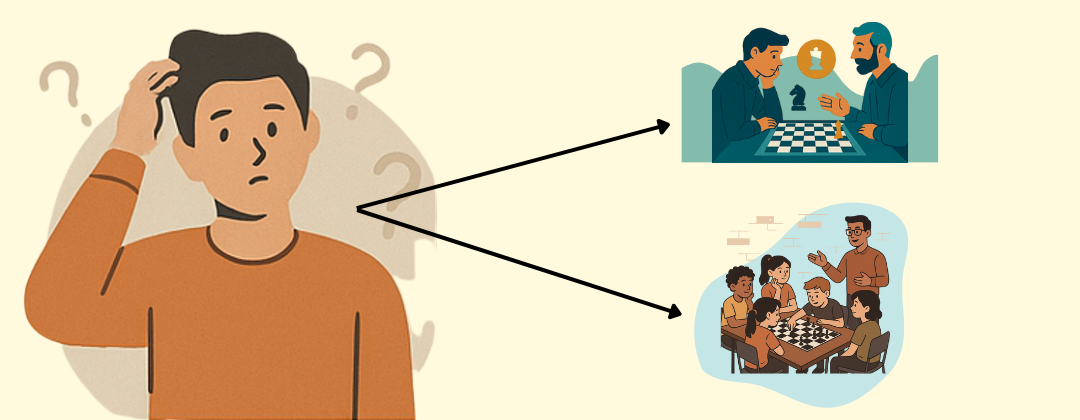Are Group Chess Classes Better Than Private Coaching?
When you’re serious about improving at chess, one question naturally comes up:
Should I join a group class or go for private one-on-one coaching?
The answer isn’t as black and white as a chessboard.
Both formats have their own advantages, and the right choice depends on your personality, goals, and current level.
Let’s explore both and help you decide.
The Power of Learning Together
Group chess classes create a learning environment that is lively, competitive, and dynamic. Watching your peers solve puzzles, tackle positions, and ask questions you hadn’t even thought of opens up your mind in ways private sessions can’t always replicate.
You learn not just from the coach, but from the class.
You see different approaches to the same position.
You develop the habit of thinking on your feet — just like in real games.
And perhaps most importantly: you realize you’re not alone. Everyone is struggling.
Everyone is improving. That feeling keeps motivation alive.
 The Hidden Lessons of Peer Competition
The Hidden Lessons of Peer Competition
In a group class, there’s always someone better than you — and someone who just made the same mistake you did. That diversity pushes you.
You want to catch up with the stronger kids.
You feel proud when you solve something others didn’t. You learn humility when someone spots a tactic you missed. That mix of competition and collaboration is a powerful teacher.
Why Private Coaching Still Matters
Of course, private coaching has its own edge. One-on-one sessions give you the luxury of:
Focused attention: Every minute is about your improvement.
Customized training: Weakness in endgames? Trouble with calculation? Your coach adapts to your needs.
Flexible pace: You set the speed. No rushing to keep up or slowing down for others.
For serious tournament preparation or correcting deep-rooted mistakes, this kind of tailored support can be invaluable.
 Structure vs Flexibility
Structure vs Flexibility
Group classes often follow a fixed syllabus. Everyone in the batch covers similar topics together — creating momentum, structure, and consistency.
Private coaching, on the other hand, offers flexibility — you can request specific topics, adjust timing, or go deeper into your favorite lines. But without self-discipline, that freedom can sometimes become a trap.
The Best of Both Worlds
Many serious players choose a hybrid model: Group classes for regular learning, practical play, and community.
Private sessions occasionally for fine-tuning, fixing blind spots, or preparing for key events. This blend offers structure without losing personalization.
The Real Question: What Keeps You Consistent?
No method works unless you show up regularly. So instead of asking “Which is better?”, try asking:
Which format keeps me more excited to learn?
Which one makes me show up every week?
Which one helps me enjoy the process, not just chase the result?
If group energy lights you up, go for it.
If you thrive in silence and reflection, private coaching might suit you better.
There’s no one-size-fits-all answer. Chess is deeply personal — and so is the way we learn it. Whether you choose group classes, private coaching, or a mix of both, the key is to start. Try one, observe how it feels, and adjust along the way.
Just like in chess, you may not find the perfect move immediately — but with thoughtful trial and error, you’ll find the one that works for you.
So, don’t overthink. Just make your next move.
— Mr. Vaishnav Jangam
































